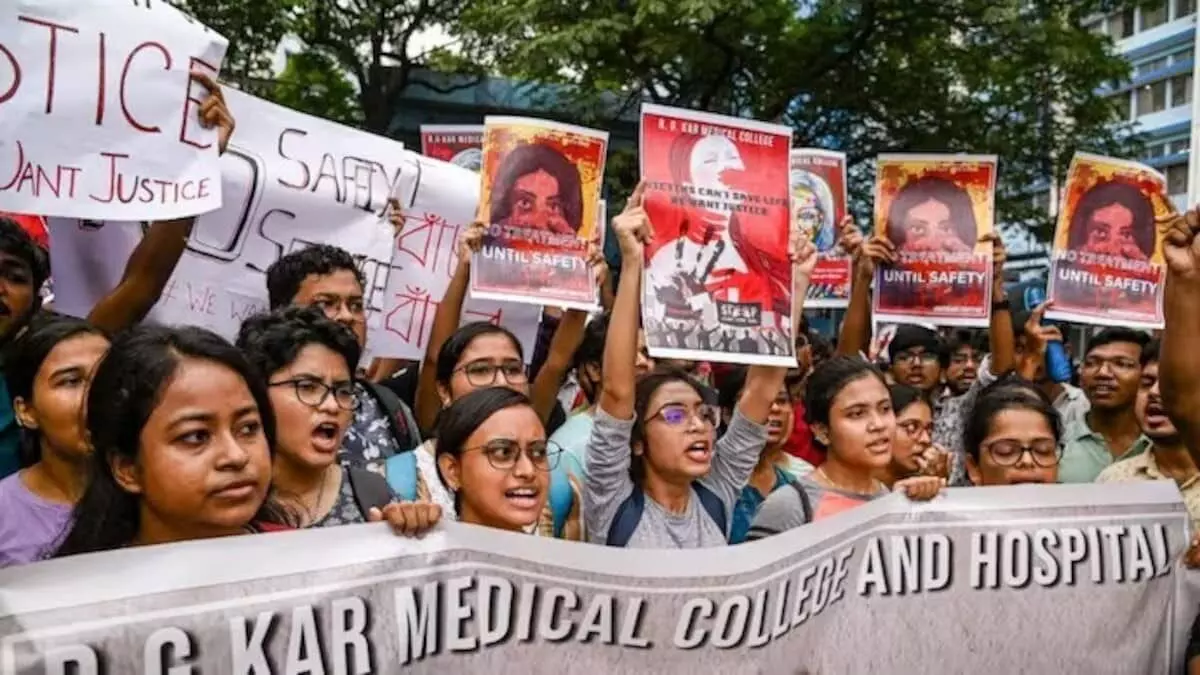How safe are women in healthcare? Kolkata doctor’s murder raises alarms
Brutal rape-murder of resident doctor in Kolkata has sparked discussions on safety measures in hospitals and medical institutions
By Neelambaran A
File Photo
Hyderabad: The brutal rape and murder of a woman doctor in the prestigious RG Kar Medical College and Hospital in Kolkata has sparked debates about the safety of women doctors and healthcare workers in India. The incident in Kolkata has highlighted the lack of sufficient safety measures in the workplace, leading to the barbaric act.
The lack of infrastructural facilities including duty rooms in specialist wards, toilet facilities and permanent security workers has come to the fore, with different doctors’ organisations airing their concerns.
Black badge protests to continue
Doctors and residents across the country have been staging protests against the brutal atrocity and have raised several concerns regarding the safety of women medicos in the workplace. “The All-India Federation of Government Doctors Association will continue the black badge protest in Telangana and other States, demanding stringent action on the culprit. This incident has exposed the lack of adequate facilities in medical institutions and the lack of attention from competent medical bodies,” said Dr Kiran Madhala, secretary general of Telangana Teaching Government Doctors Association (TTGDA).
Insufficient funds for public health
The inadequate allocation of funds by the respective governments has also been criticised since it has led to a reduced workforce and contractualisation and outsourcing of crucial roles even in premier institutions. “Many States engage security guards on a contract basis or through outsourcing. How can they be held accountable for such issues? Debarring the contracting agency or transferring one individual cannot bring any remedy. When the allocation for public health is less than 1 per cent of the budget while the global average is 10 per cent, what help can we expect,” Dr Kiran said.
With the percentage of women workforce in healthcare increasing beyond 70 per cent, the need for security remains a primary concern. A large percentage of nurses, doctors and workers in allied services are women in India.
Lack of infrastructure facilities poses risk to safety
As per reports, the doctor was allegedly attacked while she was in a seminar hall after a hard day at work due to the lack of separate resting rooms for doctors. This has raised issues regarding the lack of facilities in government-managed institutions. “Doctors should be provided with duty rooms in all specialities. Sharing rooms should be avoided. In some hospitals, restrooms are available in isolated areas where women doctors have to depend on mobile torches. This increases the risk to safety during night hours,” said Dr Prathiba Lekshmi, associate professor and member of the Telangana State Medical Council (TSMC).
The lack of permanent staff, CCTVs and security guards results in the inability to control mobs in casualty wards where even people in an inebriated condition are also found.
“This is not an isolated incident. Doctors have been killed in their workplaces. We have to ensure that stringent laws are enacted and implemented properly to prevent such incidents and punish the responsible people,” Dr Prathiba Lekshmi said.
Sexual violence complaints being suppressed
While the National Medical Council (NMC) continues to grant approvals and increase the number of courses, the lack of focus on building crucial infrastructure has come to the fore. Many have come forward to state that complaints of sexual harassment are being concealed and demanded the implementation of Vishaka Committee recommendations.
“When instances of sexual harassment are raised, the hospital administration has the habit of concealing the matter. They convince the victim to keep quiet stating that their future would be affected,” Dr AR Shanthi, secretary of DASE said.
‘Follow Vishaka committee recommendations’
Another concern raised by the Doctors Association for Social Equality (DASE) in Tamil Nadu is the effective implementation of Vishakha Committee recommendations in ensuring the safety of women in the workplace.
The association claimed that, as per the Vishakha committee recommendations, the Internal Complaints Committees (ICCs) in medical institutions are not effectively equipped to address the complaints raised by women students and employees.
“The government should ensure the formation of a functioning ICC to ensure safety from sexual harassment and other crimes in medical institutions. The health department must instruct the institutions to comply with the existing laws,” Dr AR Shanthi said.
What is immediate Action plan?
*First be alert - about surroundings and raise alarm on suspicion
*Don't believe anyone around you .No hesitation in seeking help
*Unity among colleagues should prevail .One should be tackling issues as a group taking into confidence higher officials.
Hospitals must check employees three - month drug addiction, alcoholism, crime history
Dr M Karuna, researcher and pediatrician from Hyderabad says, "It is important that there are timely safety lessons given to girls and also trainee doctors as they will be aware."